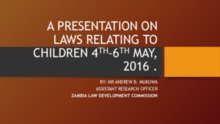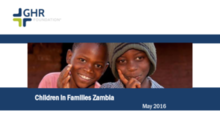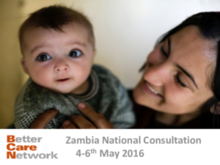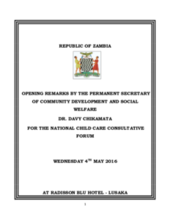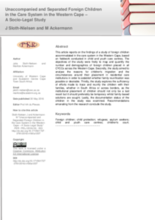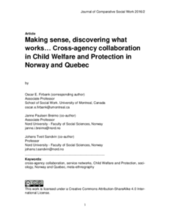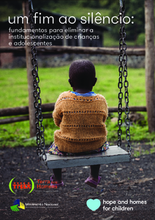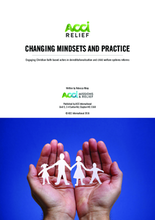Displaying 501 - 510 of 946
This presentation from the Zambia Law Development Commission, given at the Zambia National Consultation to Accelerate Care Reform, describes the Zambia Law Development Commission and its work, provides an overview of the legal framework supporting child care in Zambia, and highlights potential or pending legislation related to children’s care.
This presentation from GHR Foundation, given at the Zambia National Consultation to Accelerate Care Reform, presents GHR’s approach to reforming child care systems, the multiple aspects of the care system engaged, and its underlying theory of collective impact.
Florence Martin, Director of Better Care Network presented at the National Consultation to Accelerate Care Reform in Zambia on the work that BCN does globally, provided a summary of cross country and regional learning on on child care reform, and some of the necessary steps and considerations for care reform. A second presentation follows, highlighting the findings from an analysis of children's care and living arrangements based on data from the Zambia DHS 2013-2014.
This document includes the opening remarks given on the first day of the National Consultation to Accelerate Care Reform in Zambia by Dr. Davy Chikamata, the Permanent Secretary of Community Development and Social Welfare, to the participants of the consultation.
This special documentary episode of PBS’s “To the Contrary” explores the trend away from orphanages and towards family reunification.
This article reports on the findings of a study of foreign children, including from Burundi, accommodated in the care system in the Western Cape, based on fieldwork conducted in child and youth care centres (CYCCs).
This study seeks to understand collaboration dynamics in social services for determining what strategies work best in facilitating collaborative endeavors in specific policy and institutional environments.
Décadas de pesquisas comprovam que o crescimento em instituições de acolhida gera consequências psicológicas, emocionais e físicas, incluindo transtornos de apego, atrasos cognitivos e no desenvolvimento, e uma falta de habilidades sociais e de competências para a vida, trazendo diversas desvantagens na idade adulta.
Este documento discute el enfoque integral utilizado por Save the Children para promover la sinergia entre la autonomía personal y el desarrollo económico.
This tool was designed to help those seeking to assist Christian faith-based actors involved in long-term residential care programs make the transition from institutional to non-institutional (family and community-based) child welfare programs. It was written to give some insight into what this journey called ‘deinstitutionalisation’ might look like and what steps and processes might be involved. Whilst it contains a brief overview of the technical stages, its main purpose is to guide you through the process of achieving buy-in and is not intended to be a technical deinstitutionalisation manual.

